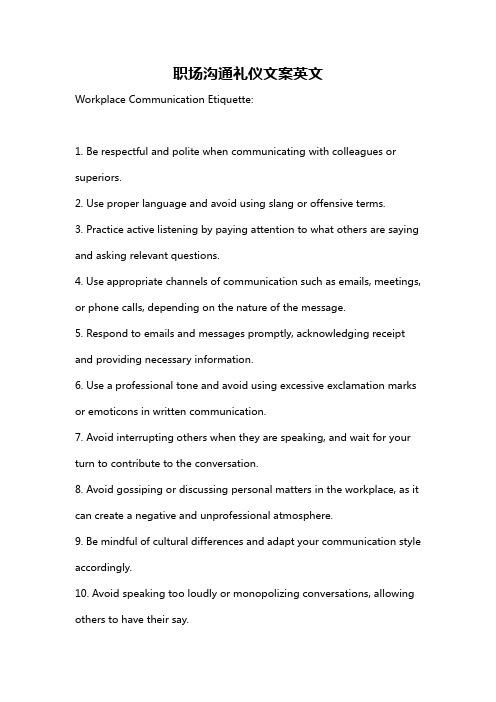英文接电话礼仪
职场沟通礼仪文案英文

职场沟通礼仪文案英文Workplace Communication Etiquette:1. Be respectful and polite when communicating with colleagues or superiors.2. Use proper language and avoid using slang or offensive terms.3. Practice active listening by paying attention to what others are saying and asking relevant questions.4. Use appropriate channels of communication such as emails, meetings, or phone calls, depending on the nature of the message.5. Respond to emails and messages promptly, acknowledging receipt and providing necessary information.6. Use a professional tone and avoid using excessive exclamation marks or emoticons in written communication.7. Avoid interrupting others when they are speaking, and wait for your turn to contribute to the conversation.8. Avoid gossiping or discussing personal matters in the workplace, as it can create a negative and unprofessional atmosphere.9. Be mindful of cultural differences and adapt your communication style accordingly.10. Avoid speaking too loudly or monopolizing conversations, allowing others to have their say.11. Use appropriate body language, such as maintaining eye contact and using gestures that are respectful and not distracting.12. Give credit to others for their ideas and achievements, fostering a positive and collaborative work environment.13. Avoid using excessive jargon or technical terms when communicating with individuals who may not be familiar with them.14. Respect personal boundaries and avoid invading someone's privacy, both in-person and digitally.15. Be concise and clear in your messages, avoiding unnecessarily long or confusing explanations.。
职场接待礼仪英文作文

职场接待礼仪英文作文英文:As a professional, it is important to know how to properly receive and entertain guests in the workplace. Here are some tips for workplace reception etiquette:1. Dress appropriately: Dress in professional attire that is appropriate for your workplace. This shows respect for your guests and the occasion.2. Be punctual: Be sure to arrive on time to greet your guests. This shows that you value their time and that you are reliable.3. Greet your guests: When your guests arrive, greet them with a smile and a handshake. This sets a positive tone for the meeting or event.4. Offer refreshments: Offer your guests something todrink or eat, such as water, coffee, or snacks. This shows hospitality and makes them feel welcome.5. Be attentive: During the meeting or event, pay attention to your guests and their needs. Anticipate their needs and offer assistance when necessary.中文:作为一名职场人士,了解如何正确地接待和招待客人是非常重要的。
各国打招呼礼仪 英文作文

各国打招呼礼仪英文作文下载温馨提示:该文档是我店铺精心编制而成,希望大家下载以后,能够帮助大家解决实际的问题。
文档下载后可定制随意修改,请根据实际需要进行相应的调整和使用,谢谢!并且,本店铺为大家提供各种各样类型的实用资料,如教育随笔、日记赏析、句子摘抄、古诗大全、经典美文、话题作文、工作总结、词语解析、文案摘录、其他资料等等,如想了解不同资料格式和写法,敬请关注!Download tips: This document is carefully compiled by theeditor. I hope that after you download them,they can help yousolve practical problems. The document can be customized andmodified after downloading,please adjust and use it according toactual needs, thank you!In addition, our shop provides you with various types ofpractical materials,such as educational essays, diaryappreciation,sentence excerpts,ancient poems,classic articles,topic composition,work summary,word parsing,copyexcerpts,other materials and so on,want to know different data formats andwriting methods,please pay attention!In the US, people usually say "Hi" or "Hello" when greeting each other. They might also give a friendly wave or a smile.In France, it's common to kiss each other on the cheeks as a greeting. They do it twice or even more.In Japan, people bow when they meet. The depth of the bow can vary depending on the situation and the respect they want to show.In India, they often put their hands together and say "Namaste". It's a respectful way to greet.In Australia, a casual "G'day" is a popular greeting. And they might give a firm handshake too.。
商务礼仪英文版

3) Placing a call on hold
I." May I place you on hold, please?” Wait for the reply II.Should the waiting time be longer, make a point of getting back to the caller on hold every 2 min to give the caller a “progress report. “Thank you for holding, ××. I am afraid that ×× is still on the other line. Would you like to keep holding or may I take a message?” III.Always thank the caller for holding and show him that we appreciate his time and patience. “Thank you for holding, this is ×× speaking, how may I assist you?”
Some phrase and sentence
One moment, please. Hold on, please. I am sorry, ***is not in the office now. Who is speaking ,please. May I have your name, please. Would you like to leave a message? Pardon, I did not get you . Would you say it again please? How to spell your name ,please? Thanks for your calling.
电话接听规范培训

- 转接操作标准:R键 + 要转接的房间 号或营业场所分机号
电话留言标准
4.岗位标准服务操作体系
当来电转接,但电话占线或无人接听时,客人要求留言, 作如下处理 - 确认:礼貌询问来电人要留言的客人姓名,如经核实不 符,则礼貌请其再次确认,如相符则为其留言 - 记录:记录留言者的姓名、联系电话、留言时间、留言内容 - 重复:重复所记录的信息,并于留言人进行核实
To 致:
From 自:
Tel. No. 电话: Date 日期: Time 时间: Message 留言:
Your Name & Signature:
留言者姓名及电话
• 电话接听示例: 预订电话
• 入住日期 退房日期 人数 房间数
• 介绍房间:档次 价格 双床/大床 • 预计到店时间 全名 手机号码 • 复述
4.岗位标准服务操作体系
- 录入:
将经过核实的信息通过固定的电脑程序输入留言内容 核实留言内容无误
在留言内容下方输入为客人提供留言服务员姓名
确认留言无误后,其他班次留言请在工作日志记录
- 若客人需要送达: 15分钟内将装有留言的信封送达客人房间 留言备份送客房服务中心备查 - 反馈:以合适方式回复客人留言处理结果
可以使用“嗯”, “好的”等简单语 言回应
1.电话接听总体要求
• • • • •
工具 -笔 - 来电记录簿 - 留言簿 - 日历
• 不会解答的问题: 不可以说,请您咨询餐饮部/工程部 应该说, 我来问一下餐饮部/工程部 稍后给您回电话
无法听清的电话沟通技巧
• 遇到无声电话时:“您好!请问有什么可以帮助 您?”稍停 3 秒还是无声,“您好,请问有什么 可以帮助您?”稍停 3 秒,对方无反应,则说: “对不起,您的电话没有声音,”再稍停 2 秒, “再见”挂机。 遇到客户声音小听不清楚时:保持自己的音量不 变的情况下:“对不起!声音很小听不清楚,请 您大声一点,好吗?”“对不起,您好的声音太 小,是否用了免提呢,请您拿起话筒,好吗?” 若仍听不清楚:“对不起!您的电话声音太小, 实在听不清?”稍停3秒, “再见”挂机。 给客人打回
中国人打招呼礼仪英文作文

中国人打招呼礼仪英文作文英文:In Chinese culture, greeting etiquette is very important. When meeting someone for the first time or seeing a friend, it is customary to greet them with apolite and respectful manner. There are a few common ways to greet someone in Chinese culture, such as saying "你好" (nǐ hǎo) which means "hello" in English, or "您好" (nín hǎo) which is a more formal way of saying hello.Another common greeting is "早上好" (zǎo shang hǎo) which means "good morning" in English. This is often usedin the morning when you see someone for the first time that day. When saying goodbye, it is polite to say "再见" (zài jiàn) which means "goodbye" in English.In addition to verbal greetings, there are also non-verbal ways to greet someone in Chinese culture. For example, it is common to bow slightly when greeting someoneas a sign of respect. In more formal situations, a handshake may also be used.中文:在中国文化中,打招呼的礼仪非常重要。
社交礼仪常用英语(完美版)

社交礼仪常用英语一、见面打招呼用语1、Can’t complain.还不错2、Couldn’t be better再好不过了3、Have you been keeping cool?你一直都好吗?4、How are you doing?你好吗?5、How are you holding up?你还撑得住吗?你好嘛?it going?/How’s tricks?6、How are you? / How’s7、How are you?你好吗?8、How have you been?你过得怎么样?9、How have you been?你过得怎么样?10、How’s life treating you?你日子过的怎么样?11、How's everything?一切都好?!我好久没有见到你了!久违了12、I haven’t seen you in agesic很好,很棒,极好之意13、I’m fine / Wonderful. / Fabulous. / Terrif14、Keeping busy?还在忙吗?15、Long time no see!好久不见16、Long time no see.好久不见。
17、Never better从没这么好过18、Never thought I’d see you here!没想到会在这遇见你!19、Nice to meet you.很高兴见到你。
20、Nice to see you again.很高兴再见到你。
21、On the mend.在好转中22、Pretty good. / I’mdoing OK / Not bad.不错啊!23、Very good. / Great很好24、What a surprise to meet you here!竟然在这遇见你!25、What are you up to? / What’ve you been up to?你最近在做什么?26、What’s cooking?有什么新鲜事?27、What’s new?有什么新鲜事?28、What’s the good word?有什么好消息吗?29、What's happening?在忙什么?任何时候都可以用,但比较见外:30、What's new?有什么新鲜事?31、What's up?近况如何?二、感谢感激用语1、I don't know what I should have done without your help.没有你的帮助我真不知道怎么办2、I don't know how I can thank you enough.我不知怎样谢你才好3、It's most thoughtful of you.你真是想得太周到了4、It's very kind of you (to help me).您真是太好了(帮了我的忙)5、It's(That's) all right.没关系6、Many thanks.多谢7、Not at all.不用谢.不客气8、Thank you (very much).(非常)感谢9、Thank you all the same.仍然要谢谢你10、Thanks a lot.多谢11、Thanks(Thank you) for listening.谢谢(收听)12、You are welcome.不用谢三、表达歉意用语1、Don't think any more about it.别再去想它了2、Don't worry about that.不要为那事觉得不安3、Excuse me(for having kept you waiting for a long time).请原谅(让你久等了)4、I must apologize.我得向你道歉5、I quite understand.我完全理解6、I really didn't mean that at all.我真的完全没有那个意思7、I'm afraid (that) I'll be late.恐怕我要迟到了8、I'm sorry for(about) that.我为此感到抱歉(或:难过、遗憾等)9、I'm sorry to have(I'm sorry that I have) kept you waiting for a long time.抱歉让你久等了10、I'm sorry to hear that.听到这个我很难过(遗憾等)11、It doesn't matter.不要紧12、It really isn't worth mentioning.那真是不值得一提的13、It was most thoughtless of me.我太卤莽了14、It's a pity that you can't come.你不能来真是遗憾15、Pardon.请原谅16、Sorry(I'm sorry).对不起17、That's all right.没关系18、That's nothing.没有什么19、What a pity!真可惜!真是遗憾20、What a shame!真丢脸四、表达意愿类用语1、All right(OK).行,可以2、Can(Could) I use your bike?我能用用你的自行车吗3、Certainly(Sure, Of course).当然可以4、Go ahead, please.干吧.(或:说吧.走吧.)5、I (don't) want(hope) to go with you.我(不)愿意(或:希望)和你一起去6、I agree that this is a good plan.我赞同这是个好计划7、I agree to help you.我答应帮你8、I agree to your plan.我同意你的计划(区别:"同意某人"用agree with;"同意某物"用agree to)9、I believe(guess, hope) so.我相信(或:猜想、希望)是这样的10、I don't think you are right there.我认为在这点上你错了11、I feel like going out for a walk.我想要出去散散步12、I intend(mean, plan) to start next week.我意欲(或:想要、计划)下周出发13、I really don't think so.我真的认为不是这样的14、I think(believe, hope) not.我认为(或:相信、希望)不是这样的15、I want(hope, wish) to go with you.我想要(或:希望)和你一起去16、I will do it myself.我要亲自干17、I wish that you would go with me.(从句要用虚拟语气)我希望你和我一起去18、I wonder if I could use your bike?不知道我能否用用你的自行车19、I would do it if I should have the chance.我若有机会,一定不放过20、I would like to go with you.我想和你一块儿去21、I would rather not tell you.我真不愿意告诉你22、I(We) agree (with you).我(或:我们)同意(你的意见)23、I'd like to go out for a walk.我想要出去散散步24、If only I could see him.(要用虚拟语气)要是我能见上他就好了25、If you say so.如果你这么说的话,(那我也同意)26、I'm afraid I (really) can't agree with you.恐怕我(实在)不能同意你的看法27、I'm afraid not.恐怕不是的28、I'm afraid you are mistaken there.恐怕你在这点上弄错了29、I'm going to start next week.我打算下周出发30、I'm ready to go with you.我愿意同你一起去31、I'm sorry, but you can use my bike tomorrow.抱歉,但明天你可以用我的自行车32、I'm sorry, you can't.抱歉,不行33、It's a good idea that we start at once.我们马上出发是个好主意34、It's a good idea to swim in summer.夏天游泳是个好主意35、May I use your bike?我可以用用你的自行车吗36、No problem.没问题37、No. I don't think so.不,我认为不是这样的38、Not at all.一点儿也不39、Of course (you may).当然(可以)40、Take it, by all means.拿去吧,完全没有问题41、Take it, do.拿吧,拿去吧42、That's a good idea.是个好主意(区别:That's the idea."是这个意思!"或"对啦!")43、That's OK(All right).那行44、That's true.是真的.或:确实是这样45、There's no doubt about it.那是毫无疑问的46、Would(Do) you mind if I open the window?如果我打开窗户,你是否介意(注意答语:"同意打开"用"No"或"Not at all"等,表示不介意;"不同意打开"用"Yes",表示介意)47、Yes(Sure, Certainly).可以(或:当然可以)48、Yes,(do) please.可以,请(便)吧49、Yes, I think so.对,我认为是这样50、Yes, just so.是的,正是这样五、其他社交礼仪常用语1、Can(Will, Could, Would) you do it for me?你能帮我做这事情吗?2、Don't crowd.别挤3、Don't forget to take a raincoat with you.别忘了要随身带上雨衣4、Don't rush(hurry).别急5、Don't you remember the days when we first met in Beijing?难道你想不起来我们在北京首次相识的那些日子了吗?6、Good heavens!(Heavens!)天哪!7、Good night.晚安.再见8、Good-bye!/Bye-bye!/Bye!再见!9、Hopefully tomorrow will turn fine.明天可望转晴10、I promise (you) a quick answer.我答应(你)从速答复11、I promise (you) that I'll help her.我答应你我将帮助她12、I suggest that he (should) start at once.我建议他立刻出发13、I think it's time for us to leave now.我想我们该走了14、I will give my bike to you.我将把我的车子给你15、I'm afraid I must be leaving(must be off, have to go) now.恐怕我得走了16、I'm glad(pleased, happy) to hear that.听到这个我非常高兴) worried about the baby.我(或:他、她)真(为这小宝宝)着急17、I'm(He’s, She’s18、Is that so?真是这样吗?19、Is there anything the matter?出毛病了吗?20、It's time I met Tom(did my homework). I have to go now.(注意从句要用虚拟语气)我该去见汤姆(或:去做作业了).现在我得走了21、Let's go to school together.咱们一起去上学吧22、Make sure of the time and place.把时间、地点弄清楚23、Make sure that everything is OK now.看一看是不是一切都好了24、Make sure that the important papers are all right please.务请保证那些重要文件的安全25、May I have your attention?请注意啦!26、No noise, please.请勿喧哗27、No smoking, please.请勿吸烟28、Oh dear!(Dear, dear!)(Dear me!)呵!哎呀!29、OH, what shall I(we) do?我(或:我们)该怎么办?30、Please give(pass) me that pen.请给(或:递给)我那支笔31、Please hurry.请快点儿32、Please line up.请排起队来33、Please stand in line.请站队.或:请排齐34、Please wait (a moment).请等(一下)35、Please wait (for) your turn.请等着轮到你吧36、Please wait (here).请(在此)等候37、Really?真的?38、See you later(tomorrow).回头见(或:明天见)39、See you.回见40、Shall we start at once?我们立刻出发好吗?41、Suppose you ring me up.你打电话给我,怎么样?42、That's nice(wonderful, great).这真好!(或:这真妙极了!这真了不起!)43、We were all anxious about her safety.我们都为她的安全而担心44、What do you say to have lunch?去吃午饭好吗?45、What(How) about a cup of tea?来杯茶怎么样?46、What's the matter (with you)?(你)怎么啦?47、What's wrong?怎么啦?出什么毛病啦?48、Why don't you try again?你为啥不再试试?49、Why not try again?为啥不再试试?50、Will(Can, Could, Would) you please give me a hand?请你帮我个忙好吗?。
常用英语问候礼仪

常⽤英语问候礼仪 随着现代社会⼈际交往的⽇渐频繁,⼈们对个⼈的礼仪更是倍加关注。
不管是在学习⼯作或⽣活中,⼈们越来越注重个⼈礼仪的发展。
下⾯是⼩编为⼤家带来的个⼈礼仪知识和应⽤,欢迎⼤家前来店铺礼仪频道参考和学习。
英语在全球是使⽤最⼲的语⾔之⼀,很多国家或者商业交往上都要使⽤英语进⾏沟通,对于英语,我们或多或少要储备⼀些常识,以防不时之需。
英语礼貌歌: Hello! Hi!是"你好!",⻅⾯问好常⽤到。
Goodbye!是"再⻅!",Good night!道"晚安!"。
同学多⽇不⻅⾯,相⻅问好"How are you?"。
答语常⽤"I'm fine. Thank you."。
初次认识新朋友,握⼿问好"Glad to meet you."。
打扰别⼈问问题,开⼝先说"Excuse me."。
别⼈关⼼帮助你,感谢⽤语"Thank you."。
致谢⽤语要牢记,That's OK."没关系。
"。
有了过错表歉意,I'm sorry."对不起。
"。
客⼈来访把⻔开,Please come in."请进来。
"。
Sit down, please. "请坐下。
"。
Please have some tea . "请喝茶。
"。
征求意⻅和请求,"May I... ?"先开头。
同意许可Yes. / Sure. / Certainly. / OK!别忘了。
英⽂中⼀些常⻅的单词,如:thanks,hello,hi,sorry等,均属于最简单的英⽂礼貌⽤语。
交谈时对⽅因感冒⽽打喷嚏,对⽅会说:"Excuse me",⽽你会说:"God bless you!"。
- 1、下载文档前请自行甄别文档内容的完整性,平台不提供额外的编辑、内容补充、找答案等附加服务。
- 2、"仅部分预览"的文档,不可在线预览部分如存在完整性等问题,可反馈申请退款(可完整预览的文档不适用该条件!)。
- 3、如文档侵犯您的权益,请联系客服反馈,我们会尽快为您处理(人工客服工作时间:9:00-18:30)。
英文接电话礼仪
电话礼仪或许你懂一点,但是现在如果你和外国人打交道那你懂
得英语的电话礼仪吗?下面是小编为大家整理的英文接电话礼仪,希
望能够帮到大家哦!
英文接电话礼仪
基础会话
1. leaving a Message (留话)
学习重点:找某人听电话
表示某人不在
表示要留话
留下自己的联络处
询问如何拼对方的姓名
会话1
留下联络处
A:This is Deng—Robert Deng from Taiwan. I‘d like to
speak with your Director.
我姓邓,台湾的Robert邓。请您们主任听电话。
B:Mr. Jones is not in right now. May I take a message?
Jones 先生现在不在,您要不要留话?
A:Yes. Could you ask him to call me at the Hilton Hotel,
Room No. 579?
好,请转告他打电话到希尔顿店,579号房来找我,好吗?
B:Certainly, Mr. Deng. Hilton Hotel, Room 579?
没问题,邓先生,希尔顿579号房吗?
A:That’s right. Thank you.
没错,谢谢您。
词语
1.This is……我是……。在电话中说明“我是谁”时,是用“This
is……”,而不是“I am”。
2.I‘d like to……等于“I would like to……”——“我想……”。
“would like”为“want”的客气用法。
3.speak with …… 找……听电话;与……讲话
4.in 在(家、办公室)中。此处的“in”不是介系词,而是副词。
5.right now 现在。“right”为副词,意思是“正是”,为强调
的用法。
6.take a message (帮人)留话。“take”是“记下;记录”,
“message”是“口信;传话”。
7.No n. “No”是“number”的缩写,通常放在数目字的前面,
表示“第……号”,如“No. 3”,即是“第三号”。
8. certainly adv. 当然可以;好(口语用法)
关键句型
CALLER:请转告他打到……找我
Could you ask him to call me at……?
这句型适用于找不到对方,或对方有事不能前来接听时,留下自
己的联络处,请其回电。
“at”之后可接地点或电话号码。“could”是请求或征询时的助
动词,用于请求、委托时,语气谦和客气。
同义句
Would you tell him to call me at……?
Could you inform* him that I can be reached* at……?
Would you have him get back to me* at……?
inform v. 通知
reach v. 能联络得到
get back to (someone) 回(某人)电话
RECEIVER:他不在,您要留话吗?
I take a message?
这句话适用于“某人”只是暂时不在,而仍会回来之时。请对方
留话即表示自己将告知“某人”,请其主动联络,而不必劳烦对方再
打来。“may”是用于请求或征询时的助动词,也可用“can”代替,
不过“may”在语气上较为客气。
同义句
Mr. Jones is out* at the moment*. Would you like to leave a
message?
Mr. Jones is not available* right now. May I give him a
message for you?
Mr. Jones is away from his desk*. Can I take a message?
out adv. 外出;不在
at the moment 现在;此刻
available a.是指“找得到人;在此处”的意思
away from one’s desk不在位子上
电话礼貌英语用语
1、A Longer Message
记录较长的留言
2、G:I'm trying to reach Mr.White in Room 3301, but there's
no answer.Could I leave a message for him?
旅客:我想和3301房间的 White先生通电话,但是没有人接,我
能给他留言吗?
3、R:Certainly.The message is for...?
接待员:当然可以。请问您给谁留言......?
4、G:Bob White in Room 3301.
旅客:3301房间的 Bob White先生。
5、R:3301.Go ahead,please.
接待员:3301,请继续说。
6、G:Please tell Mr.White that the meeting in Beijing
tomorrow has been canceled. I'll see him again in Guangzhou
next Monday.
旅客:请告诉White先生明天在北京召开的会议取消了,我下星期
一在广州与他见面。
7、R:I'm sorry,would you repeat that please?
接待员:对不起请您重复一下好吗?
8、G:Tell Mr.White the meeting in Beijing tomorrow is
canceled and I'll see him in Guangzhou next Monday.
旅客:告诉White先生明天在北京召开的会议取消了,我下星期一
将在广州与他见面。
9、R:Meeting in Beijing tomorrow is cancelled and you'll see
Mr.White in Guangzhou next Monday. Is that right?
接待员:明天在北京召开的会议取消了,您将在下星期一与他在广
州见面。是吗?
10、G:That's right.
旅客:是的。
11、R:May I have your name please,sir?
接待员:请告诉我您的名字好吗?
12、G:Bill Thompson.
旅客:比尔。汤姆森。
13、R:Bill Thompson.Thompson?
接待员:比尔。汤姆森 Thompson?
14、G:That's right.
旅客:对。
15、R:Is there anything else?
接待员:您还有别的事吗?
16、G:No,thank you.
旅客:没有了,谢谢。
17、R:I'll give Mr.White the message as soon as he returns.
接待员:White一回来,我就把留言条给他。
18、G:Thank you.
旅客:谢谢。
19、R:You're welcome.
接待员:不客气。
20、G:Goodbye.
旅客:再见。
